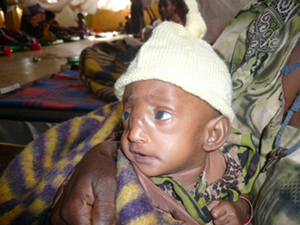Jill's Ethiopian Diary: Birth, barbecued maize and the weekly shop.
28/08/2008
Many more donkey and carts are seen on a daily basis now, laden with maize, cabbages, bananas and ginger going to and from markets. In most of the areas, there is now a visible reduction in the severe acute malnutrition admissions.
Hopefully this trend will continue if the crops are successful and prices stable enough for people to afford to buy and sell their food. And more selfishly, MSF staff are very happy that we can now have a more varied diet. BBQ maize is very good!
 |
|
A malnourished child in an MSF feeding center in Ethiopia.[Jill Clare Mowbray / MSF]
|
Last week I helped to complete a rapid assessment in two communities badly affected by malnutrition in the Kachabira and Tambara districts. The rapid assessment tool was a questionnaire used to gather information on household sizes, ages of the children and adults, morbidity since April and numbers of people in the MSF program.
The average household size is 9 to 12 people. They live in tukuls, round, thatched single room buildings made with wood and mud. They cook and sleep in the same place, often with animals. It was a strange experience to be talking to the families while donkeys and goats were walking in and out of the tukuls eating maize leaves.
The results showed that MSF managed to target the worst affected areas and although the situation is still serious, morbidity is greatly reduced since our intervention.
In the Outpatient Therapeutic Program (OTP) in Hadero we are discharging a lot of people now that they are reaching their target weight, and oedema is resolving. We receive many thanks, but the smiles are the best reward.
One old man arrives on donkey and cart each week. Six weeks ago he could not sit unaided. This week he was sitting and smiling. Next week he will be discharged. Hopefully food will be available for him and all the other discharged patients to prevent them getting sick again in the coming weeks and months. Time will tell.
In the meantime, we continue to work hard screening communities, ensuring that the moderately malnourished receive assistance early to prevent them becoming severely malnourished.
We have many pregnant and breast-feeding women in the moderate acute malnutrition program, where we provide food rations every two weeks. I have seen quite a few women who one week they are pregnant and the next visit they are breast-feeding. One woman arrived on donkey and cart the same day as giving birth to collect her rations. Quite different to Europe. Not sure we would see anyone doing their weekly shop on the same day as giving birth there, especially not on a donkey and cart!